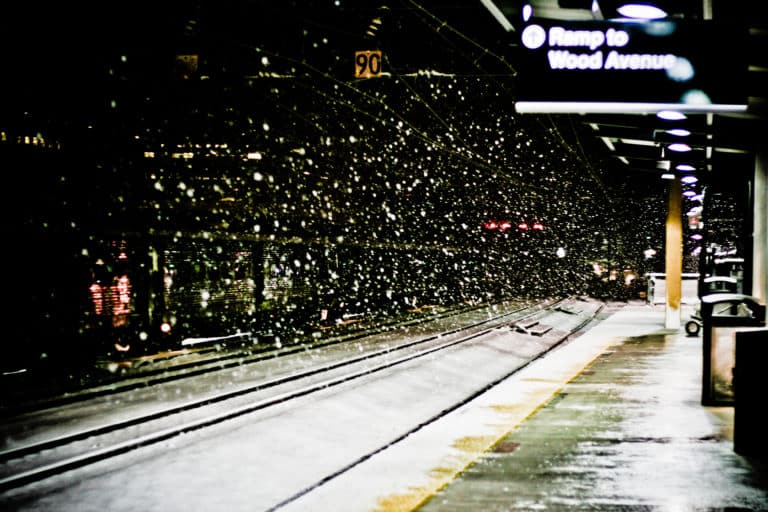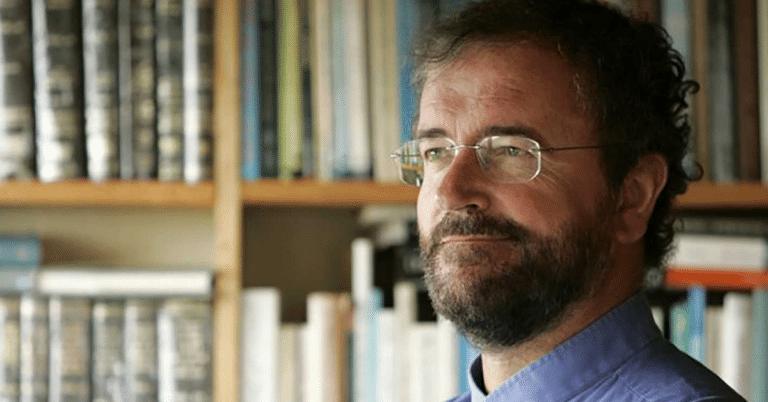
Image by Jim Lukach/Flickr, Attribution.
This Clamorous Neon Heart
Trace your finger over a map of New Jersey, and there’s my hometown, jammed into the state’s cinched waist. Central Jersey is overrun with people and pizza joints, nail salons and displaced deer.
I grew up with 18-wheelers bleating on and off through the night, a trucker’s lullaby playing out on Route 1. And pretty soon I learned to make certain distinctions: cars on slick roads sound like eggs dropped into sizzling grease; cars whizzing by on dry asphalt are more like fogged breath on glass. The natural landscape is dissonant. Cows graze beside an interstate. Pigeon-chested homes sprout atop soil that once fed apple orchards. A sagging bowling alley cuts off a listless scrim of trees.
I know Rachel Carson assured us that “those who contemplate the beauty of the earth find reserves of strength that will endure as long as life lasts.” But how can these “reserves of strength” bolster towns squeezed hard in the grip of asphalt and fluorescence? Our sky is so crowded with industry, even at night what is above our heads refuses to blacken completely. We look up, mistaking the pin-pricked light of airplanes for stars.
Yet, I know this — if I fail to find reserves of strength between the dashed lines of the Garden State Parkway, my spirit is as thin as that stand of bowling-alley trees. If I am waiting on the lush green embrace of a prayer garden, I am lost and far from home.
Jesus tried retreating to remote places to pray. Remember how that usually worked out? He found himself interrupted, as crowds followed and even pressed up against him. He too was surrounded.
I’m making plans to visit Our Lady of Gethsemani this summer, the Cistercian monastery in Kentucky where Trappist monk and author Thomas Merton lived for nearly three decades. Can stillness and uninterrupted natural vistas clear a straight path to God, or will immensity seem barren to me, born and raised in an atmosphere of horror vacui?
I am eager to hike those grounds. But I dwell in Gethsemani each morning alongside Merton, as I sip my first cup of tea and read from his journals. In these moments Merton is resurrected on the page, conversing with me through the lines of text I underscore in soft gray pencil.
Morning after morning, I carve out my own imagined Gethsemani, right here in the disrupted landscape of Central New Jersey. I’ve conjured up this dark, august, rural place, seeking solace and a few square feet of silence from 750 miles away. I keep Gethsemani warm and well-lit as cars whoosh past my blackened windows, and I am reminded that the real Gethsemani presented its own challenges. Merton, in fact, was known to gripe about crows and jet planes crowding out his own few square feet of silence.

As I read, the fridge drones in low tones, the coffee pot burps, and, as Merton wrote:
“We are ‘one to his farm and another to his merchandise.’ Lights on. Clocks ticking. Thermostats working. Stoves cooking. Electric shavers filling radios with static. ‘Wisdom,’ cries the dawn deacon, but we do not attend.”
I try to attend. Honestly, some mornings I attend, head off to work and forget every single syllable. Wisdom dissipates somewhere between my bedroom floor and the tea-stained front seat of my Honda.
Wisdom. Yes, switching off the TV news and stashing my cell phone in another room aid attendance. Still, I’m not sure I can fall in line behind Merton and his anti-electric-shaver brigade. I want to trust the dawn deacon to rise above the razor’s hungry buzz.
While I do seek nourishment in green places — the small, tidy pine forest forming a fragrant cathedral in the university garden, the canal path a few miles from home — most days I must be content drawing Gethsemani to my apartment across four states, fortifying myself before breakfast.
I wonder about Kentucky this summer: what if I pass a guy on the road hawking Thomas Merton car magnets? Will Gethsemani teem with the chaos that lurched toward me in Fatima, clotted with tour buses, a Salve Regina hotel, and knots of pilgrims on their knees, swarming an oak tree?
A friend tells me she plans to compile a list of “sacred and profane places” in a neighboring county. I wonder how she’ll manage the labels. The sacred and the profane mingle, moment by moment, in me, in Merton, in Fatima, and that’s how it is around here, too. In Central New Jersey, the sacred and the profane collide, jostle, interrupt, and sometimes even mock one another, like a pair of jeering brothers in a pickup basketball game.
Sometimes, from where I sit, this place seems like all sharp elbows and coarse brags.
But I choose to believe God can rub up against rough things in these crowded places where I live and work and watch for airplanes and stars. Because here we are, every morning — God cutting through traffic, God bursting through the clamorous neon heart of all that tries to drown out the dawn deacon.



Share your reflection